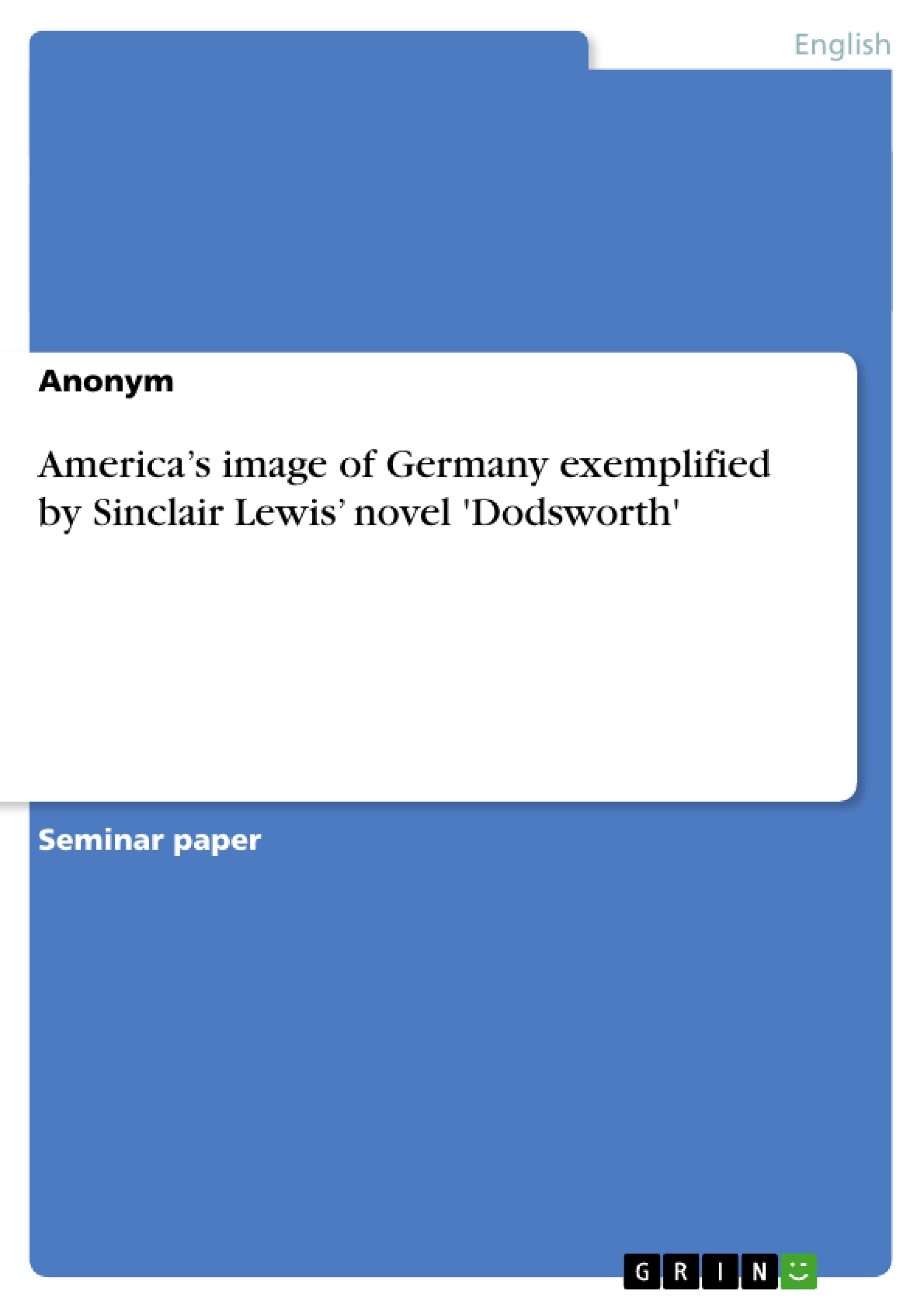Sinclair Lewis’ novel Dodsworth is about the amb itious automobile manufacturer Sam
Dodsworth from a town called Zenith, somewhere in the United States. At the age of 50, Sam
is rich enough to refuse the well-paid job his company offers him. His American wife of
German descent, Fran, convinces him to live in Europe for a while. And so the Dodsworths
experience England, France and Germany in the late 1920ies. Sam, “the great Herr Geheimrat
Generaldirektor that developed the entire motor industry” (116) – as Fran called him once
ironically – goes with his wife on a trip to Europe to escape the narrowness of the provincial
town of Zenith. During this journey to Europe, or especially during their stay in Berlin, Sam
and Fran’s marriage falls apart.
In this novel, Berlin seems to function as the basic cause for the ruin of the Dodsworths’
marriage. What is the power, the influence, that Berlin exerts on the Dodsworths’ life? Fran
and Count Kurt von Obersdorf, two of the main characters, are both responsible for the later
separation of Fran and Sam and the breaking of their matrimony by divorce. Why was this
possible in Berlin?
This question is closely connected with the American conception of Germany. It must be
clarified how America views Germany, which image of Germany is portrayed in Sinclair
Lewis’ novel. In this context, the attitudes of the different characters (Sam, Fran, Count
Obersdorf, etc.) towards Germany must be analyzed. However, since Fran’s ancestors came
directly from Europe (Germany), her conception of this country differs significantly from
Sam’s. The latter represents the standard Mid-Western American of the early 20th century and
has never been abroad to Europe.
The interpretation of three selected sample passages will demonstrate how the image of
Germany develops throughout the novel, and how this changing image eventually affects Fran
and Sam’s marriage. Sam Dodsworth is the main character of the novel and his mind and
ideas also undergo a development. [...]
Inhaltsverzeichnis (Table of Contents)
- Fran Voelker's German Background
- Sam's Image of Germany Through European Experiences
- Berlin as the Cause for the Breakdown of the Dodsworth's Marriage
Zielsetzung und Themenschwerpunkte (Objectives and Key Themes)
This novel examines the image of Germany in early 20th century America, specifically through the lens of Sinclair Lewis' novel Dodsworth. It aims to analyze how the American conception of Germany influences the characters' actions and relationships, particularly focusing on the breakdown of Sam and Fran Dodsworth's marriage.
- American Perception of Germany
- Cultural Assimilation and Identity
- Marriage and its Breakdown in a Foreign Context
- Influence of European Culture on American Identity
- Development of Character and Perspective Throughout the Novel
Zusammenfassung der Kapitel (Chapter Summaries)
The initial chapters of the novel present Fran Voelker's German background and the first impressions Sam Dodsworth receives about Germany. These early descriptions paint a picture of a wealthy, cultured, and intellectual German family. Sam, having never been to Europe, is impressed by Fran's European experiences and her family's German heritage.
As the story progresses, Sam and Fran embark on their trip to Europe, and their experiences further shape Sam's image of Germany. The text includes various allusions to German culture, including references to German cars, cities, and historical figures, providing a glimpse into the cultural landscape of Germany as perceived by Sam.
The climax of the novel takes place in Berlin, which serves as a symbol for Germany and Europe as a whole. This setting plays a pivotal role in the disintegration of Sam and Fran's marriage, highlighting the potential impact of foreign cultures on American relationships.
Schlüsselwörter (Keywords)
The primary keywords and focus topics of the novel include American conception of Germany, cultural assimilation, identity, marriage, breakdown of relationships, European influence, character development, and the role of Berlin as a symbol of Germany and European culture.
Frequently Asked Questions
What is the central theme of Sinclair Lewis' novel "Dodsworth"?
The novel explores the American conception of Germany in the late 1920s, focusing on how European experiences influence the identities and marriage of an American couple, Sam and Fran Dodsworth.
How does Fran Dodsworth's background differ from Sam's?
Fran is of German descent and views Europe as a source of culture and intellectualism, whereas Sam represents a standard Mid-Western American who has never been abroad before this journey.
What role does Berlin play in the novel?
Berlin serves as the primary setting for the breakdown of the Dodsworths' marriage, symbolizing the powerful and often disruptive influence of European culture on American values.
How does the image of Germany evolve for Sam Dodsworth?
Initially impressed by Fran's heritage, Sam's perception is shaped by real-world encounters with German industry, cities, and social structures, leading to a significant development in his own perspective.
Who is Count Kurt von Obersdorf?
He is a key character encountered in Germany who, along with Fran's actions, contributes significantly to the eventual divorce of the Dodsworths.
What does the "narrowness of Zenith" refer to?
It refers to the provincial and limited social life of the American town the Dodsworths come from, which they hope to escape by traveling to Europe.
- Arbeit zitieren
- Anonym (Autor:in), 2003, America’s image of Germany exemplified by Sinclair Lewis’ novel 'Dodsworth', München, GRIN Verlag, https://www.grin.com/document/23492



